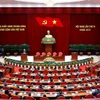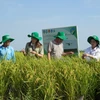Hanoi (VNS/VNA) - A government-run regulatory sandbox could bring a major shift in management thinking, which would allow tech companies to test new business models, within a flexible legal framework and learn from practical experience before scaling up implementation, agree businesses and entrepreneurs.
Co-founder of one of the early unicorns in Vietnam Nguyen Ba Diep, Momo's Vice Chairman, said institutional reform is the fastest, most effective, and least costly way to support such businesses.
He stressed that translating resolutions into real actions requires strong State and enterprise participation. With the right policies, the private sector can make breakthroughs and become a solid pillar of the national economy.
“If that is achieved, the sandbox will be a symbolic policy and a true launchpad for breakthrough business models. If the sandbox is implemented swiftly and synchronously, with real-world feedback taken into account, it will become a powerful driver for Vietnam’s start-up ecosystem,” Diep said.
He said that the Government’s move to introduce a regulatory sandbox, a special legal framework for innovative enterprises, marks a significant advancement in regulatory thinking.
It allows tech businesses to experiment within a flexible legal environment, drawing lessons before broader deployment. What businesses hope for, however, is not just the existence of a sandbox, but its consistent implementation across the whole system, from central to local levels, from regulators to enforcement bodies.
Investment Director of Nam Long Group Nguyen Thanh Huong, expressed the real estate sector’s hope for a transparent, competitive business environment. She called for equitable access to land resources, which are crucial for developers of housing and urban areas, and for institutionalisation in land development policies.
Vice Chairman of the Ho Chi Minh City Business Association Dinh Hong Ky said institutional reform must guarantee and effectively protect private enterprises’ rights, including property rights, freedom to conduct business, equal competition and contract performance.
It is essential to create a level playing field, reduce interference, eliminate administrative barriers and the outdated 'ask–give' mindset, where what cannot be controlled is banned. He also emphasised the need to distinguish between criminal, administrative and civil liability, and corporate and individual responsibility in law violations.
“The two per cent interest rate support scheme for small, innovative and ESG-focused businesses is urgent. However, in practice, implementation has faced many obstacles, both from banks and businesses,” Phat said. He pointed out that previous support packages were hindered by complex procedures and post-audit pressure, which made both banks and enterprises hesitant to participate.
Phat added that the interest rate support is insufficient and must be complemented with broader reforms, including administrative simplification, digitalisation of credit approval, and more detailed development of green credit frameworks. He also noted that private banks offered preferential and green capital packages, with abundant domestic resources ready to support businesses once bottlenecks are removed.
Nguyen Dinh Tung, CEO of T&T Vina, highlighted ongoing challenges in the agricultural sector, where 'if it can’t be managed, it’s banned' remains a common mentality, stifling innovation and investment.
He cited the durian industry as an example.
Farmers require substantial capital, but harvests only begin after one or two years, making it difficult to use on-land assets as loan collateral. He proposed that the Government officially recognise and allow agricultural assets formed on land to be used as collateral, instead of limiting credit access to land use right certificates.
Dr Nguyen Xuan Thanh, a lecturer at Fulbright University Vietnam, said that in recent years, sustained high economic growth in Vietnam has largely been driven by domestic private enterprises, whether large corporations or small and medium-sized businesses.
This private-led growth demands an efficient market economy with a highly competitive business environment. Under this framework, the government builds institutions to regulate and address market failures./.

See more
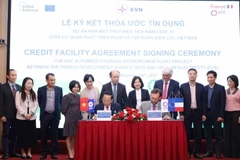
AFD provides 76-million-EUR loan for Vietnam’s first pumped-storage hydropower plant
The Bac Ai hydropower project has a designed capacity of 1,200 MW, comprising four turbines of 300 MW each, with a total investment of 21.1 trillion VND (802.5 million USD).

Southern housing market gains momentum on the back of growing infrastructure
Experts forecast that in 2026 a stronger shift towards outlying areas, especially projects linked to public transport and green standards, will shape product trends and developers’ strategies.

Quang Tri province tightens control to keep unqualified fishing vessels ashore
Through inspections, awareness campaigns, and the collection of vessel documentation from local fishermen, authorities aim to equip the provincial monitoring system with full data to manage all vessels and block non-compliant boats from fishing, he said.
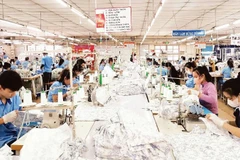
Textile, garment industry secures role in global supply chain
By diversifying markets, products and customers, the sector has mitigated risks and responded proactively to market fluctuations, despite numerous challenges such as disrupted supply chains, rising shipping costs, and rapidly changing purchasing policies in many markets.
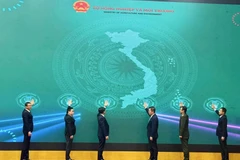
Farm produce traceability system unveiled in push for digital agriculture
The system is a key component of agricultural digital transformation, designed to boost the value of Vietnamese produce and build greater trust among consumers at home and abroad.

Petrovietnam tasked with six pioneering initiatives to fuel double-digit growth
Petrovietnam should also lead in adopting sci-tech, digital transformation, green transition, data infrastructure and artificial intelligence to accelerate its shift toward renewables, hydrogen, liquefied natural gas, nuclear power and offshore wind.

Vietnam Mobility Show 2025 opens in Hanoi
Taking place at a time when Vietnam’s automobile industry is undergoing strong transformation towards electrification and emission reduction, the show aims to introduce advanced technologies, eco-friendly vehicles, and sustainable mobility models.
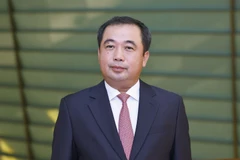
Agriculture-environment sector maintains stable growth in 2025 amid global volatility: Minister
Despite mounting global uncertainties and increasingly severe climate impacts, Vietnam’s agriculture and environment sector maintained stable growth in 2025, reinforcing its role as a key pillar of the economy while advancing green transformation and strengthening resilience to natural disasters, said Minister of Agriculture and Environment Tran Duc Thang.
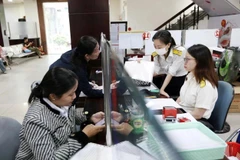
Millions set to benefit from personal income tax reduction from 2026
Under the amended Law on Personnal Income Tax, the personal deduction will rise to 15.5 million VND (590 USD) per month from 11 million VND at present. Taxpayers are also entitled to mandatory insurance deductions and contributions to charity and humanitarian funds.

Hanoi shopping festival 2025 opens to boost domestic consumption
Featuring around 120 standard booths, the festival has attracted nearly 110 enterprises from 14 provinces and cities nationwide, including Dien Bien, Lao Cai, Son La, Ninh Binh, Thai Nguyen, Quang Ninh, Hai Phong, Bac Ninh, Hung Yen, Hanoi, Thanh Hoa, Da Nang, Ho Chi Minh City and Khanh Hoa.
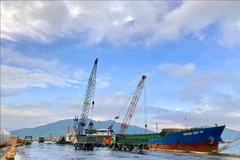
Large room for Vietnam to achieve two-digit economic growth: Experts
The restructuring of the economy, particularly public investment, along with the financial and banking systems, has been identified as a critical solution to achieving double-digit growth in the next development phase.
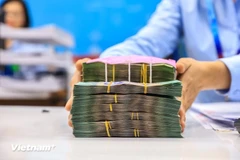
Reference exchange rate going down on December 26
The State Bank of Vietnam set the daily reference exchange rate at 25,128 VND/USD on December 26, down 5 VND from the previous day.
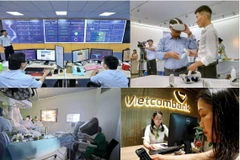
Digital economy – driver for Vietnam’s breakthrough in new development phase
The digital economy is establishing itself as a pillar of Vietnam’s development process as it is expected to reach about 39 billion USD in 2025 and boasts one of the fastest growth rates in Southeast Asia.
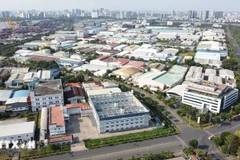
HCM City posts 24% rise in registered FDI in 2025
As of December 31, Ho Chi Minh City is expected to continue leading the nation in valid FDI capital and project numbers, with total registered capital standing at 141.9 billion USD across 20,310 projects.

Dak Lak province intensifies fight against IUU fishing
Sen. Lieut. Nguyen Tien Khanh, from Hoa Hiep Nam border guard station, reported that fishermen now show a much stronger grasp of fisheries rules and exactly what compliance demands from their day-to-day operations. That heightened awareness is paying off, intensifying local crackdowns on IUU practices and preparing for the upcoming European Commission (EC)'s 5th inspection round.

Long Thanh int'l airport expected to help boost growth of southern key economic region
Economic experts noted that as Vietnam’s largest aviation hub and a symbol of international integration, Long Thanh will significantly enhance foreign direct investment inflows into Dong Nai and the southern region.
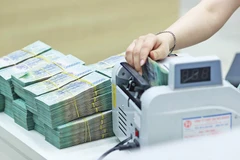
Vietnam steps up anti-money laundering vigilance amid rising digital assets
Since the Anti-Money Laundering Law was enacted in 2022, the Anti-Money Laundering Department has received thousands of suspicious transaction reports (STRs) annually, with the number of reports growing by about 30% each year. Since 2023, based on these reports, the department has collected and analysed information, issuing nearly 600 documents related to over 5,000 STRs.

Credit management must ensure high GDP growth, macroeconomic stability: Experts
Credit management should be cautious and effective to enable linking high economic growth with macroeconomic stability and financial system reforms.
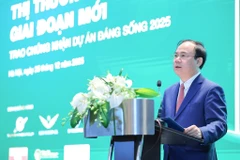
Property market anticipated to stabilise as legal bottlenecks addressed: Forum
Real estate projects in Vietnam that have been delayed by regulatory obstacles will gradually see their difficulties resolved, helping to increase market supply and unlock resources for development, Deputy Minister of Construction Nguyen Van Sinh has said.
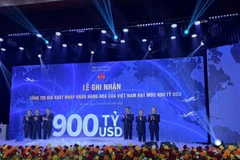
Vietnam’s trade turnover tops 900 billion USD for first time
Vietnam's total trade in 2025 reached about 920 billion USD, up 16.9% year on year. Of the total, exports were valued at 470.59 billion USD, a year-on-year increase of 15.9%, while imports amounted to 449.41 billion USD, up 18%, resulting in a trade surplus of around 21.2 billion USD.





